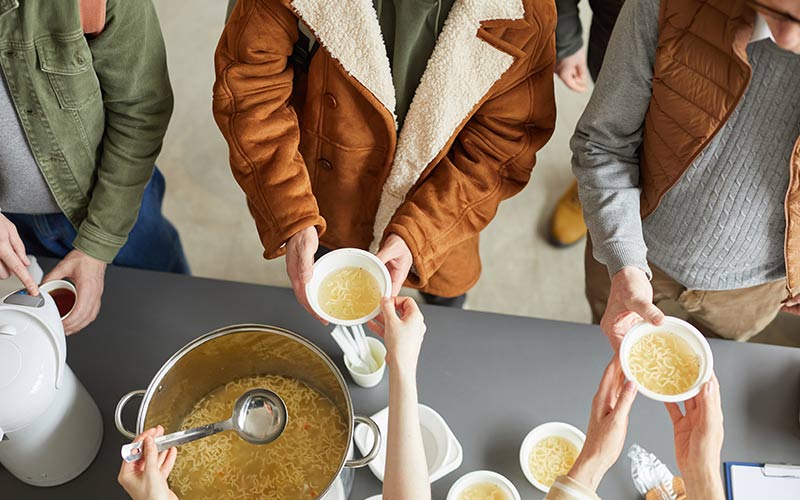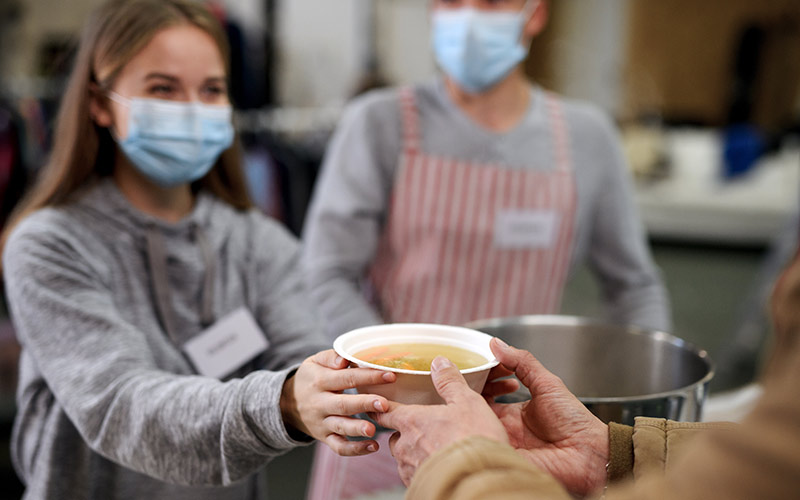We all have our own struggles, but some have it a little harder than others. Fortunately, for those with a little extra, there are different ways to make everyday life a little easier for someone. So if you’re looking for a way to give back but aren’t sure how, why not volunteer at a soup kitchen?
What Is a Soup Kitchen?
A soup kitchen is a place where the homeless and destitute can get a meal for free. Usually, the meal consists of a hearty soup and some bread, though sometimes the meal can be more substantial.
Soup kitchens are often run by religious organizations or charities, which means volunteers help keep them running. With enough resources, some soup kitchens can give visitors a little extra food to take with them or even provide other necessities like hygiene kits.
Benefits of Volunteering at a Soup Kitchen
There are a few places where the most vulnerable members of society can get some help without anyone asking questions. So it’s clear what those who visit a soup kitchen get out of it. But what do volunteers get from the experience?
Here are a few benefits to consider.
1. Meet Like-Minded People
As with many other volunteer activities, volunteering at the soup kitchen in your area will help you meet others with similar values. It’s a chance for you to make friends you might otherwise not have met.
Since you already know you share a passion for helping people, it’ll be easier for you and fellow volunteers to connect. After all, if you already share your values, so who knows what else you could have in common?
2. Learn New Skills
There are different tasks needed to make sure a soup kitchen runs smoothly, like taking inventory and cleaning up. So if you’re not much of a cook but still want to volunteer at a soup kitchen, don’t worry. It’s not just preparing and cooking food or serving it.
Taking inventories means paying attention to details so you can report what supplies and ingredients you’re running out of. Being able to keep track of details is a skill that’s crucial for many jobs. Monitoring costs and expenses is also just as important to ensure the group is spending money wisely.
In short, taking time out of your day to help out at a soup kitchen can help better equip you for life outside of volunteering.
3. Be More In Tuned with Life

Besides volunteers, you’ll meet those who come to a soup kitchen for a warm meal and even temporary shelter. In doing so, you can learn about their life stories.
If they’re willing to share them, you stand a chance to learn valuable lessons you won’t get from movies or books. There’s also a chance to see what life is like for someone in a different ethnic group or from a different socioeconomic class.
There’s also something about meeting someone and learning about their circumstances that makes problems like homelessness feel more real – and more pressing. It’s one thing to read that nearly 600,000 individuals are currently experiencing homelessness. The reality of that hits home when you meet such an individual at a soup kitchen.
4. See the Bright Side
When you volunteer at a soup kitchen, you start to see your own problems in a different light.
While there’s no one right way to react to life’s setbacks, it’s generally healthier to appreciate what you have than to resent what you lack. You have every right to stress over your problems, of course. But if that’s all you do, you risk ignoring the good in your life.
Maybe you don’t have enough saved up to move out on your own and have to stay with your parents a little longer. Or, your car needs repair, and you have no choice but to commute to work each day while it’s in the shop.
With the new perspective you gained from volunteering, you’ll feel blessed about having a roof over your head. You’ll be thankful you have a stable job and can afford to have your car repaired.
How Do Soup Kitchens Help the Community
According to the National Institute for Health Care Management (NIHCM) Foundation, 34 million people in the U.S. live in food-insecure households. And 53 million turned to community programs – like soup kitchens – to help get food.
This is why soup kitchens are important. Those with the resources – money, food, or time – can reach out and share their blessings. Meanwhile, those in dire need can get some help and have a roof over their heads, even for a short while.
In a way, soup kitchens are where communities come together.
When someone goes to a soup kitchen, they do so knowing no one will judge or discriminate against them or make them feel worthless. That’s why besides providing food, soup kitchens serve as a refuge for those less fortunate. They’re a reminder that people still care in some way.
For an individual who’s lost everything, having a place to belong and be accepted is a powerful feeling. Even if it’s just for an hour or so, that feeling can do a lot for someone’s morale, particularly on special occasions.
Volunteering at A Soup Kitchen Near Me: FAQs

Given all of the above, you may feel like you want to start rather than simply volunteer at a soup kitchen. Bear in mind, though, that it’s not as easy as it sounds. And though it’s a worthwhile undertaking, it’s better to look for a soup kitchen in your area rather than start a new one.
That said, here are a few more things you need to know.
Where can I volunteer at a soup kitchen?
If you’re unsure where to start looking, you can contact local food banks, religious organizations, and outreach groups in your community. These groups can help you get in touch with a soup kitchen that’s looking for help.
How old do you have to be to volunteer at a soup kitchen?
Normally, volunteers of all ages are welcome at soup kitchens. But if you’re still in school or you plan to involve school-aged children, check with the coordinator. Due to safety concerns, some soup kitchens have age restrictions for certain tasks or areas.
How can I help my local soup kitchen?
Since soup kitchens rely primarily on volunteers, new ones are always welcome. Still, it’s good to call ahead of time. That way, you learn which soup kitchen needs volunteers the most. From there, you can talk with a coordinator to determine what they urgently need help with.
Besides volunteering, you can donate food such as canned goods, salad dressings, and even creamer and sugar. Supplies like napkins and dish soap are important, too, as are personal care products and clothing for soup kitchens that provide such items.
What do you do when you volunteer at a soup kitchen?
Volunteers can take on a variety of tasks, depending on their skills and desires. You could be called on to greet guests, clean up tables, or put together take-away bags. If you don’t have much time but still want to help, you can pick up donations and bring them to the soup kitchen.
No matter what tasks you end up doing, your presence is what counts.
You Can Make a Difference

You don’t have to be extremely rich or have entire days free to help at a soup kitchen. If you have the willingness to serve and the commitment to find time to help, that’s more than enough.
When you volunteer at a soup kitchen, it’s both uplifting and humbling to see that you really do have what you need. That’s why you can afford to help the less fortunate. That brings with it satisfaction and happiness that money can’t buy.
You Can Also Read These:
- How To Volunteer At An Animal Shelter? How Old Should You Be?
- How To Start A Community Garden In Your HOA Community
- Bond With Food: How To Start Community Cooking Sessions In Your HOA




